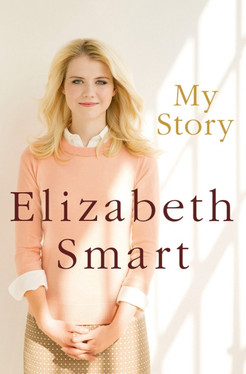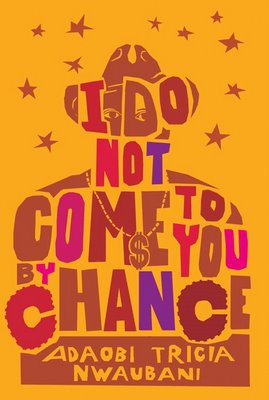With struggles of unemployment, social decadence and the zeal to
make it in a society that is ridden by corrupt people, the novel “I Do Not
Come To You By Chance” chronicles
the realities that lead people into a life of crime.
Presented in a satirical form to open the window into the
realities of the “socially-declined populace” who got themselves involved in a
fast-paced life, “I Do Not
Come To You By Chance” tells
a familiar story from an unfamiliar angle in a twisted and funny way.
It chronicles the
life of a young man, Kingsley Ibe, who assumed the role of a loving son,
self-sacrificing brother, disappointed lover, and savvy 419er – a distinction from the way his England-educated, civil servant father
would have wanted him to turn out.
Kingsley Ibe, the protagonist in the novel, is the first-born son
(opara) of his family. A fresh graduate of engineering from a family
that has highly prized education and despised those who chase money instead of
knowledge, Kingsley is committed to his college sweetheart, Ola, and he is
confident that his brilliant results will get him a good job in an oil firm so
that he can support his and Ola’s families.
Sadly, Kingsley receives multiple rejection letters while Ola -
with the pressure from her mother loses faith in his ability to ever provide
for her needs; particularly in doing the right thing by her in paying the
‘shuddering’ bride price associated with the Igbo tribe of the eastern part of
Nigeria. As Kingsley put it; “Marrying an
Igbo girl entails much more than fairy-tale romance and good intentions.”
While he was still battling with how he was going to win back Ola
and his mother, a family crisis ensued as his father’s illness took a worse
turn thereby taking the Ibe’s family from the edge of poverty to its depths.
Kingsley becomes more desperate as his ailing father's health dwindles and he had to either succumb to the wills of
the fast-lane life of his uncle Boniface, aka Cash Daddy (a secondary school
dropout turned email scam billionaire) or hold on to the moral principle that
“stripped” his parents of everything but their pride, particularly when he had
learnt that one must have a “long leg” to survive in his country.
Kingsley gradually made his choice by succumbing to his maternal
uncle’s fraudulent world. Cash
Daddy, a conman of blubbery greed and unabashed naked exhibitionism was happy
to help as long as Kingsley uses his formally educated brain to aid his immoral
schemes. As Kingsley puts it, "He could probably even talk a spider into
weaving silk socks for him."
Cash Daddy represents the image of a bushman rising from grass to
grace. His behaviour is disgusting and at the same time daring whether he is
devouring a meal with his hands, quoting the Bible or taking a business meeting
while defecating.
Kingsley journey into an immoral lifestyle was gradually woven
from Kingsley’s parents’ courtship in the prologue to establish that Kingsley
and his immediate family were not the type who would bend to any scam.
Its short chapters and grueling descriptions of some of Nigeria’s
discomforts on health care and public transport are used to exhibit the reality
of everyday life in the Nigerian society.
The novel is an eye-opener to the troubles of everyday Nigerian –
from the struggles of unemployment down to the struggle of trying to make it in
a society that is ridden by corrupt people; the mind- boggling lifestyle of the
419ers (Referenced by their Nigerian penal code number, the 419 scam) as well as
the poor health services in which patients have to buy their own bandages and
IV fluids are also some of the issues that endear one to read the novel.
Even Kingsley’s old school mate, Andrew Onyeije, whom he met at
the airport crooned “I love Nigeria
soooooo much, whatever happens, I’m gonna come back here and settle someday.
With my family.” But he was quick to change his patriotic tune when his
American passport was stolen at the airport, he screeched, “This country is seriously fucked up.” But Kingsley was quick to
interject in his narrative voice that “The country is not fucked up and
certainly not a place for idealising and auld lang syne” but that “Once you
faced the harsh facts and learned to adapt, Nigeria became the most beautiful
place in the world.”
Nwabani weaved the Kingsley’s story in such a way that you begin
to see things from a con-artist point of view and even cheer him on in his
escapade. It becomes more enchanting when one sees how Kingsley systematically
cons a mugu who blindly falls into the trap he
set for them.
It’s a fairly overwhelming scenario with Kingsley using his
education to draft e-mails urging anonymous mugus.
No one will buy it, Kingsley thinks at first. “Who on this earth was stupid
enough to fall prey to an e-mail from a stranger in Nigeria?” Then the replies
begin to come. Someone in Auckland, another in Cardriff , then a woman in
Wiscosin. “Soon we were on first-name terms. It was almost like staying up to
watch a dreadful movie simply to see what happened at the end.”
As Kingsley falls reluctantly under his mentor's spell and discovers
his own innate flair for the art of the confidence trick, Nwaubani takes us
deeper into the intricate world of the Nigerian e-mail scam. She gave detailed
exposition of the methods deployed to string along Western suckers who are
gradually converted into a mugu.
Targeted mugus get emails like - "Dear Friend, I do not come to
you by chance. Upon my quest for a trusted and reliable foreign business man or
company, I was given your contact by the Nigerian Chamber of Commerce and
Industry. I hope that you can be trusted to handle a transaction of this
magnitude"- and surprisingly the victims get caught in the fraudster’s
web. People like Winterbottom, Mirabelle and Hooverson were silkily dubbed
through Kingsley gang fraudulent act.
Kingsley method of conning his victim is also humorous that one
finds himself laughing out loud at the gullibility of the victims. The one who
stole the show the most was Cash Daddy, who with his bush-like attitude of
conducting business meetings in the toilet and eating with his mouth open
inject humour and his witty sayings and proverbs endear us more to understand
the world of the con-artist the more.
As a narrator, Kingsley infuses his own story with humor, warmth,
and no small amount of rueful regret bemused him by the place in which he finds
himself. In his own view, he sacrificed himself as the family messiah to haul
them out of poverty and yet he believed he was not appreciated for his effort.
In the end, he yielded to using Cash Daddy’s word that “relatives are the cause
of hip diseases.”
Meanwhile, Cash Daddy, tired of just making money, dabbles into
politics and gets himself killed. Upon Cash Daddy’s death, Kingsley refuses to
take over the reins of leadership of the organisation as he felt in control of
his destiny for the first time in years.
The theme of a good person tempted by circumstances to do bad
things is not a new one in literature, but author Nwaubani makes it fresh by
plunging the reader into a dizzying new world of 419ers (scammers) and the mugus (victims). Her characters are
fully fleshed out and dimensional. The novel reveals larger-than-life
characters, impressive operations and the greedy westerners that make up both
sides of the 419 business.
The strength of the novel becomes apparent when the good versus
evil distinction begins to blur – especially for Kingsley. The narrative soars
when Kingsley is detailing the 419 work of Cash Daddy’s inner circle – a much
more complicated world. It is a world where a gullible mugu deserves no sympathy. When Kingsley
expresses doubt to his uncle, Cash Daddy responds: “Do you know this is the man whose
money is going to feed your children and your children’s children children?” He
condemns Kingsley’s ‘holier than thou” attitude by telling him, “You say you
don’t eat rat but you want to taste only the tail. Please don’t close my ears
with all this rubbish about education. Me I don’t believe in film tricks. I
believe in real life action.”
Cash Daddy further reassures him that his sympathy is misplaced. “Why are you taking Panadol for
another person’s headache?” he
asked. “Don’t think America and Europe is like Nigeria where people suffer
anyhow. Over there, their governments know how to take good care of them. They
don’t know anything about suffering.”
Thus, readers are invited to see the whole fraught relationship
between Africa and the West in the microcosm of deceptively simple e-mails from
Nigeria. There is a vivacious anger underneath all the tricks and the levity.
When challenged regarding the immorality of ripping off unsuspecting
Westerners, Nwaubani's characters explicitly cite slavery and the Western
exploitation of the Niger Delta's oil wealth as justification; they're merely
repatriating capital that they feel was taken from them unjustly.
The picture is further complicated by the charitable use to which
a great deal of the embezzled money is put to build schools, pave roads and
fund orphanages. "No
matter what the media proclaimed," says Kingsley, "we were not
villains, and the good people of Eastern Nigeria knew it."
While the novel has a serious undertone, there are many
laugh-out-loud moments.
However, Nwuabani simply rushed the ending of the novel as an
eight-page epilogue was quickly constructed to indicate that Kingsley has set
up his own organisation where his ever-admonishing mother pays him a visit,
showing her acceptance of his new, seemingly legit, status. In reality, it’s a
cover up as we see him take a call from a former mugu, Mr Winterbottom, and it
is business as usual. This is done perhaps to show that fraudsters like
Kingsley still exist in the society under false pretences.
Also, Nwuabani’s elongated
the ‘back-grounding” - as she used almost half of the book- the first part of
the book- (144 pages) - to explain the circumstances that led to Kingsley’s
decision into the e-mail scam world could have been done in a couple of
chapters.
We knew from the start that
he was going to make that decision. Probably because of this elongation, the
decision to join Cash daddy scam group comes across as escapist as he could
have find a way out of the family problem by other means since he had already
told his mother that he would be going to live with Aunt Dimma to get a job in
the banking sector.
In spite of these imperfections, I
Do Not Come To You By Chance is
a highly recommended read as it is a no-boner into the realities of the social
issues in the Nigerian society. It is alternately funny, tender, satirical and
sad and the dialogues are sharp with laugh-out-loud moments. The plot is also relatively
simple and the language was easy to follow.
Though the novel has its flaws, the positives far outweigh the
negative as the flaws are compensated as the issues that Kingsley faced were
both believable and real.










